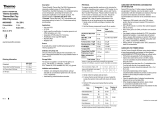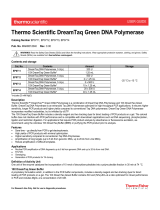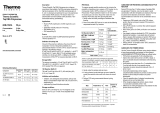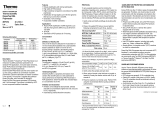Page is loading ...

Protocol
Template DNA
Optimal amounts of template DNA in the 50 µl reaction
volume are in the 0.01-1 ng range for both plasmid and
phage DNA, and in the 0.1-1 µg range for genomic DNA.
Higher amounts of template increase the risk of genera-
tion of nonspecic PCR products. Lower amounts of
template reduce the accuracy of the amplication.
All routine DNA purication methods are suitable for
template preparation e.g., Genomic DNA Purication Kit
(#K0512), GeneJET™ Plasmid Miniprep Kit (#K0502).
Trace amounts of certain agents used for DNA purica-
tion, such as phenol, EDTA and proteinase K, can inhibit
thermostable DNA polymerases. Ethanol precipitation
and repeated washes of the DNA pellet with 70% ethanol
normally remove trace contaminants from DNA samples.
Primers
The recommended concentration range of primers is
0.1-1 µM. Too high primer concentrations increase the
probability of mispriming and thereby appearance of
nonspecic PCR products.
For degenerate primers and primers used for long PCR
higher primer concentrations in the range of 0.3-1 µM are
often favorable. Therefore start optimization from
standard concentrations and increase if necessary.
Mg2+ Concentration
Mg2+ in general stabilizes primer-template complexes.
PCR buffers for Taq DNA Polymerase are supplemented
with Mg2+, while in PCR with Pfu DNA Polymerase
MgSO4 is a preferable component. Due to the binding of
Mg2+ to dNTPs, primers and DNA templates, Mg2+
concentration needs to be optimized for maximal PCR
yield. The recommended concentration range is 1-4 mM.
If the Mg2+ concentration is too low, the yield of PCR
product could be reduced. On the contrary, non-specic
PCR products may appear and the PCR delity may be
reduced if the Mg2+ concentration is too high. If DNA
samples contain EDTA or other metal chelators, the Mg2+
ion concentration in the PCR mixture should be increased
accordingly (1 molecule of EDTA binds 1 molecule of
Mg2+(1)).
Recommended Mg2+ concentrations:
• Taq DNA Polymerase is supplied with two buffers:
Taq buffer with KCl and Taq buffer with (NH4)2SO4.
K+ stabilizes primer annealing whereas NH4
+ has a
destabilizing effect especially on weak hydrogen bonds
between mismatched primer-template base pairs.
Therefore for standard PCR with Taq DNA Polymerase
and 0.2 mM dNTPs the recommended MgCl2 concen-
trations are in general lower 1.5±0.25 mM when using
Taq buffer with KCl compared to 2.0±0.5 mM when
using Taq buffer with (NH4)2SO4. Due to antagonistic
effects of NH4
+ and Mg2+, Taq buffer with (NH4)2SO4
offers higher primer specicity in a broad range of
magnesium concentrations at variety of annealing
temperatures.
• For standard PCR with Pfu DNA Polymerase, 2 mM
MgSO4 is recommended. Volumes of 25 mM MgCl2 or
25 mM MgSO4 solutions required to reach a specic
concentration of magnesium ions in the 50 µl reaction
volume:
Final 1.0 1.25 1.5 1.75 2.0 2.5 3.0 4.0
Volume of 25
mM MgCl2 or
MgSO4, µl
22.5 33.5 4 5 6 8
Components of the Reaction Mixture
This protocol is for the Components of the Reaction Mixture

22 dNTPs
The recommended concentration of each dNTP is 0.2
mM. In certain PCR applications higher dNTP concentra-
tions are required. Due to the binding of Mg2+ to dNTPs,
Mg2+ concentration needs to be adjusted accordingly. It is
essential to have equal concentrations of all four nucleo-
tides (dATP, dCTP, dGTP and dTTP). If the nucleotide
concentrations are not balanced, the PCR error rate may
dramatically increase. PureExtreme® dNTP Mixes
contain either 2 mM or 10 mM, or 25 mM of each
nucleotide. The concentrations of all four dNTPs are
perfectly balanced to provide delity and to increase the
yield of PCR products.
To achieve 0.2 mM concentration of each dNTP in the
PCR mixture, use the following volumes of dNTP Mixes:
To prepare 1 ml of working solutions of dNTPs (dNTP
Mixes) from individual 100 mM dNTPs or dNTP Set, use
the following volumes of reagents:
Thermostabile DNA Polymerases
Taq DNA Polymerase. Taq DNA polymerase is the most
commonly used enzyme for PCR. It is suitable for most
amplifcation reactions that do not require high delity
enzyme or PCR products longer than 3 kb.
Normally, 1-1.5 u of Taq DNA Polymerase are recom-
mended for a 50 µl volume of a PCR mixture. Nonspecic
PCR products may appear at higher concentrations of the
polymerase. However, it may be necessary to increase the
amount of Taq DNA Polymerase to 2-3 u, if the PCR
mixture contains inhibitors, for instance, due to contami-
nation of the template DNA.
Taq DNA polymerase, if PCR is assembled at room
temperature, exhibits low but noticeable activity during
the reaction set-up. As a result, non-specic priming
events, such as mispriming or formation of primer dimers,
which occur at ambient temperatures, will lead to
generation of nonspecic amplication products during
PCR. Therefore, PCR reaction set-up should always be
performed on ice.
DreamTaq™ DNA Polymerase. DreamTaq™ DNA
Polymerase is an enhanced Taq DNA polymerase
optimized for all standard PCR applications. It ensures
higher sensitivity, longer PCR products and higher yields
compared to conventional Taq DNA Polymerase.
DreamTaq™ DNA Polymerase uses the same reaction
set-up and cycling conditions as conventional Taq DNA
Polymerase. An optimization of reaction conditions is
generally not required. It is supplied with optimized
DreamTaq™ buffer, which includes 20 mM MgCl2.
DreamTaq™ DNA Polymerase generates PCR products
with 3’-dA overhangs. PCR with DreamTaq™ DNA
Polymerase is inhibited by dUTP, but the enzyme can
incorporate modied nucleotides.
Hot Start Taq DNA Polymerases. Hot start PCR uses
enzymes, which have no activity at room temperature and
are activated only at high temperatures during PCR
cycling (e.g. TrueStart™ Hot Start Taq DNA Polymerase
or Maxima® Hot Start Taq DNA Polymerase). In hot
start PCR non-specic amplication is reduced and target
yield is increased. Using hot start DNA polymerases, PCR
can be set-up at room temperature. TrueStart™ Hot Start
Taq DNA polymerase has very short activation time (1
min) and can be used without changing of regular PCR
cycling protocol. Maxima® Hot Start Taq DNA Poly-
merase is activated in 4 min.
Pfu DNA Polymerase. Pfu DNA Polymerase is a thermo-
stable DNA polymerase with proofreading activity. It is
one of the highest delity enzymes among thermostable
DNA polymerases and is widely used in applications
which require high delity amplication, e.g. cloning and
expression. Normally, 1.25-2.5 u of Pfu DNA Polymerase
are used in a 50 µl volume of PCR mixture. The actual
amount of enzyme required for optimal PCR yield and
delity depends on the target to be amplied and on the
presence of inhibitors in the PCR mixture. Pfu DNA
polymerase is a slower enzyme than Taq DNA polymerase
and it requires an elongation time of 2 min/kb. Also, Pfu
DNA polymerase often requires more PCR cycles to
produce sufcient amount of PCR product. Due to the
intrinsic 3’≥5’ exonuclease activity Pfu DNA polymerase
should always be the last component added to the
reaction mixture to avoid degradation of primers. It is
also recommended to use longer PCR primers. Alterna-
tively, phosphorothioate primers (exo- resistant primers)
can be used to avoid primer degradation by Pfu DNA
Polymerase (2).
PCR Enzyme Mixes. Long PCR Enzyme Mix and High
Fidelity Enzyme Mix are blends of Taq DNA Polymerase
and a thermostable DNA polymerase with a proofreading
activity. The two enzymes synergistically generate long
PCR products in greater yields and higher delity than
Taq DNA Polymerase alone. The Long PCR Enzyme Mix
is also used for efcient amplication of GC-rich DNA
regions. Normally, 1.25-2.5 u of Enzyme Mix are used in
a 50 µl volume of PCR mixture. Due to the 3’≥5’ exo-
nuclease activity of proofreading enzyme Enzyme Mixes
Volume of
PCR mixture
dNTP Mix,
2 mM each
(#R0241)
dNTP Mix,
10 mM each
(#R0191)
dNTP Mix,
25 mM each
(#R1121)
50 µl 5 µl 1 µl 0.4 µl
25 µl 2.5 µl 0.5 µl 0.2 µl
20 µl 2 µl 0.4 µl 0.16 µl
Component
dNTP Mix,
2 mM each
(#R0241)
dNTP Mix,
10 mM each
(#R0191)
dNTP Mix,
25 mM each
(#R1121)
dATP, 100 mM 20 µl 100 µl 250 µl
dTTP, 100 mM 20 µl 100 µl 250 µl
dGTP, 100 mM 20 µl 100 µl 250 µl
dCTP, 100 mM 20 µl 100 µl 250 µl
Water,
nuclease-free 920 µl 600 µl -
Total volume 1 ml 1 ml 1 ml

North America
Technical Services:
techservice.genomics@thermofisher.com
Customer Services:
customerservice.genomics@
thermofisher.com
Tel 800 235 9880
Fax 800 292 6088
Europe and Asia
Technical Services:
techservice.emea.genomics@
thermofisher.com
Customer Services:
customerservice.emea.genomics@
thermofisher.com
thermoscientific.com
© 2012 Thermo Fisher Scientic Inc. All rights reserved. All trademarks are the property of Thermo Fisher Scientic Inc. and its subsidiaries. Specications,
terms and pricing are subject to change. Not all products are available in all countries. Please consult your local sales representative for details.
#
thermoscientific.com
© 2012 Thermo Fisher Scientic Inc. All rights reserved. All trademarks are the property of Thermo Fisher Scientic Inc. and its subsidiaries. Specications,
terms and pricing are subject to change. Not all products are available in all countries. Please consult your local sales representative for details.
Protocol
should always be last components added to the reaction
mixture to avoid degradation of primers. It is also
recommended to use longer PCR primers. Alternatively,
phosphorothioate primers (exo-resistant primers) can be
used to avoid primer degradation by enzyme mixes.
PCR Master Mixes. Thermostable DNA polymerases can
be provided in a Master Mix format, a ready to use 2X
concentrated solution, which includes DNA polymerase
together with a PCR buffer and nucleotides. The Master
mix is the most convenient and cost effective product for
routine or high throughput PCR, where time for setting
up a reaction and reproducibility of results are most
important factors.
We offer two PCR Master Mixes. The PCR Master Mix
(2X) contains Taq DNA polymerase and is suitable for
routine PCR. The PyroStart™ Fast PCR Master Mix (2X)
contains a hot start Taq DNA polymerase and is formu-
lated to work in fast thermal cycling conditions to reduce
time not only dedicated to PCR set-up, but also to PCR
cycling. PCR of less than 1 kb target can be completed in
25 min using this product.
References
1. David, H., Modern Analytical Chemistry, Mc Graw
Hill, 315, 2000.
2. Skerra, A., Phosphorothioate primers improve
the amplication of DNA sequences by DNA
polymerases with proofreading activity, Nucleic
Acids Res., 20, 3551-3554, 1992.
/










